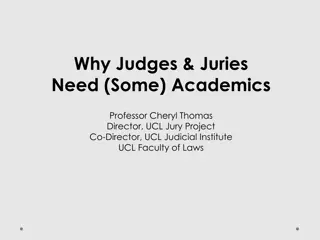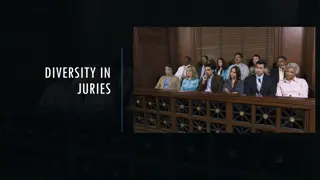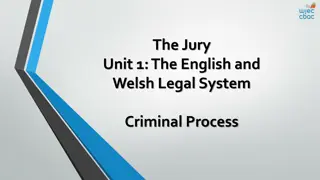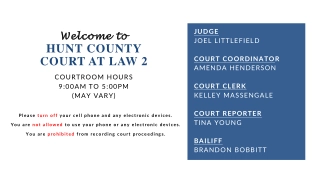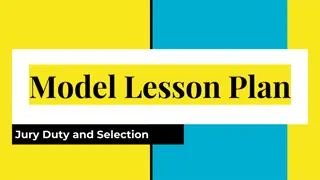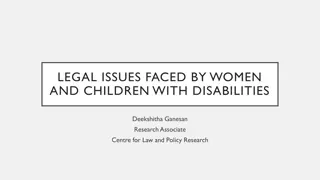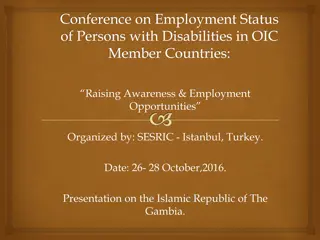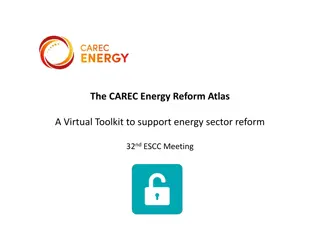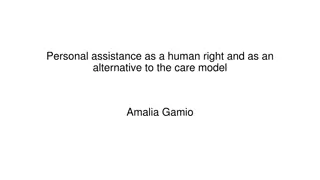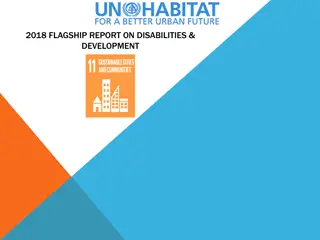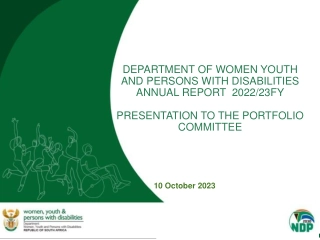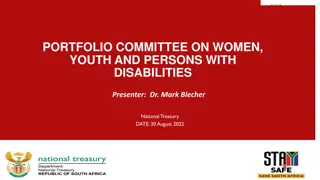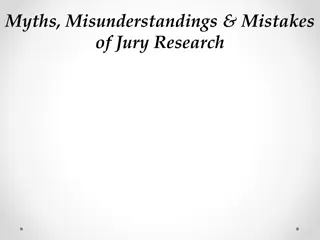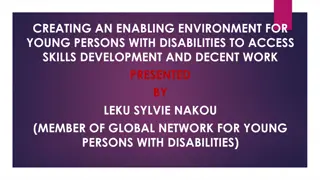Proposals for Law Reform: Access to Jury Service for Persons with Disabilities
Law reform proposals focus on enhancing access to jury service for individuals with disabilities, aligning with the 2006 UN Convention. The Law Reform Commission's 2013 report emphasized recommendations for accommodating persons with disabilities during jury trials, ensuring fair and equal participation. The report highlighted the necessity for reasonable facilities and interventions to facilitate their engagement. Additionally, it suggested beginning long criminal trials with 15 jurors for enhanced deliberation and diverse perspectives.
Download Presentation

Please find below an Image/Link to download the presentation.
The content on the website is provided AS IS for your information and personal use only. It may not be sold, licensed, or shared on other websites without obtaining consent from the author. Download presentation by click this link. If you encounter any issues during the download, it is possible that the publisher has removed the file from their server.
E N D
Presentation Transcript
Proposals for Law Reform: Access to Jury Service for Proposals for Law Reform: Access to Jury Service for Persons with Disabilities Persons with Disabilities Role of Law Reform Commission Commission s 2013 Report on Jury Service included recommendations on access to jury service for persons with disabilities Influence of 2006 UN Convention on Rights of Persons with Disabilities Developments since 2013
Role of Law Reform Commission Role of Law Reform Commission Commission was established by Law Reform Commission Act 1975 Commission carries out legal research and makes proposals to reform the law Commission carries out public consultation and then publishes Reports with recommendations for reform It is up to the Government and the Oireachtas whether to implement the Commission s recommendations
Commissions 2013 Report on Jury Service Commission s 2013 Report on Jury Service Report formed part of Commission s Third Programme of Law Reform Report made 56 recommendations for reform of the law on jury service The Report recommended that persons with disabilities willing and able to serve on juries should be provided with reasonable facilities to do this The Report also recommended that long and complex criminal jury trials should begin with 15 jurors
Influence of 2006 UN Convention on Rights of Persons with Influence of 2006 UN Convention on Rights of Persons with Disabilities Disabilities Article 13 of the 2006 UN Convention: equality principle Article 2 of the 2006 UN Convention: reasonable accommodation For jury trials, reasonable accommodation means necessary and appropriate modification and adjustment not involving disproportionate burden Key guiding principle: persons with disabilities have right to a fair trial, which includes a trial that respects the equality principle
Equality principle and fair trial: (1) language capacity Equality principle and fair trial: (1) language capacity All jury members should understand English language to the extent required to carry out jury duties Recommended reform of law: person is eligible for jury service able to understand English to the extent required to carry out jury duties
Equality principle and fair trial: (2) physical capacity Equality principle and fair trial: (2) physical capacity A person s physical capacity may require reasonable accommodation to carry out jury service and ensure the right to a fair jury trial Recommended reform of law: person is eligible for jury service unless the person s physical capacity, taking account of reasonable supports and accommodation, means he or she cannot carry out jury duties
Equality principle and fair trial: (3) health capacity Equality principle and fair trial: (3) health capacity A person s health capacity may require reasonable accommodation to carry out jury service and ensure the right to a fair jury trial Recommended reform of law: person is eligible for jury service unless the person s health capacity, taking account of reasonable supports and accommodation, means he or she cannot carry out jury duties
Equality principle and fair trial: (4) decision Equality principle and fair trial: (4) decision- -making capacity making capacity A person s decision-making capacity may require reasonable accommodation to carry out jury service and ensure the right to a fair jury trial Recommended reform of law: person eligible for jury service unless person s decision-making capacity, taking account of reasonable supports and accommodation, means he or she cannot carry out jury duties
Developments since 2013 Developments since 2013 2015: Assisted Decision-making (Capacity) Act 2015 became law 2017: Richard Dudley selected for jury service 2018: Ireland ratified the 2006 UN Convention on the Rights of Persons With Disabilities 2018: Department of Justice and Equality established Working Group on Jury Reform to examine the Commission s Report 2020: Programme for Government commits to reform Irish legislation to reflect the 2006 UN Convention September 2020: Patricia Heffernan carried out jury service, with assistance of two Irish Sign Language interpreters


